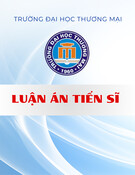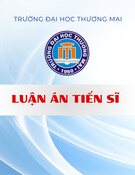1
INTRODUCTION
1. The urgency of the theme:
Originating from developed countries, corporate social responsibility
(CSR) has reached developing countries and Vietnam is no exception,
especially in global integration and competition. The concept of CSR in
Vietnam is often viewed from the perspective of the Government. That is,
CSR is often viewed as the requirements from the Government that businesses
need to be responsible for the locality where they operate. In this approach,
businesses implement CSR passively, and in the perspective of complying
with legal regulations.
However, many studies have shown that implementing CSR proactively
can bring many benefits for businesses, such as improving employee
productivity, loyalty, operational efficiency, reputation, and relationships with
business stakeholders so companies should approach CSR proactively. The
proactive implementation of CSR helps businesses satisfy the host
government's requirements and helps companies achieve development and
other strategic goals. Therefore, this Thesis approaches the concept of CSR not
only from the government’s perspective (complying with the laws), but also
from the business's perspective, recognizing social responsibility as a tool that
companies can use to manage relationships with stakeholders.
Among various the business's strategic goals, maintaining and
improving the reputation seems to be of the utmost importance. Reputation is
the goal and an intermediate step to help the company achieve all of its
remaining goals. A business with a good reputation will help build trust with
customers, partners, and the Government, thereby making business operations
more effective and easier to achieve goals in sales, market, and finance.
CSR is not a new concept but is becoming increasingly popular in
enterprises globally (KPMG, 2015; Porter, 2006; Reid & Toffel, 2009). CSR's
development has always been in line with expanding FDI inflows into
developing countries in the 1990s (Goyal, 2005). The participation of FDI
enterprises has positive effects on the host country, reflected in the addition of
capital to the total national investment capital in order to achieve economic
growth targets; contribute to improving the general balance of payments
through a straight increase in the balance of capital; create conditions for
countries to access new technologies, promote technology transfer, and at the
same time improve management skills, production, and qualifications of
employees (Cao Thi Hong Vinh, 2016). However, despite receiving many
incentives from host country, FDI enterprises are posing many pressing
environmental and social problems to the country such as environmental































